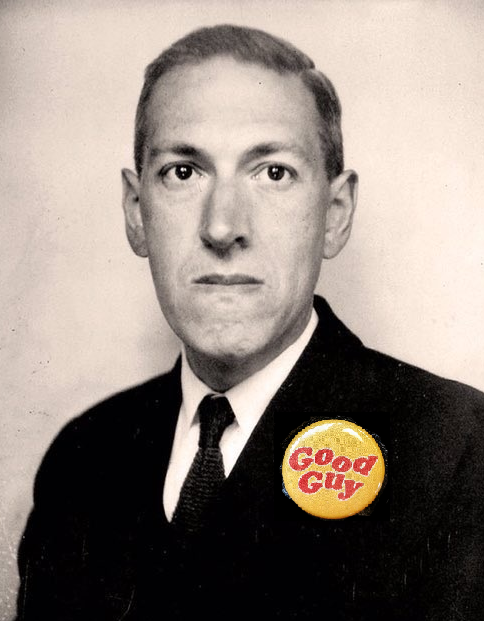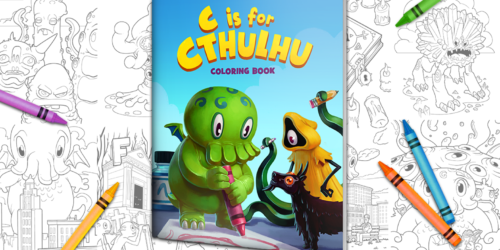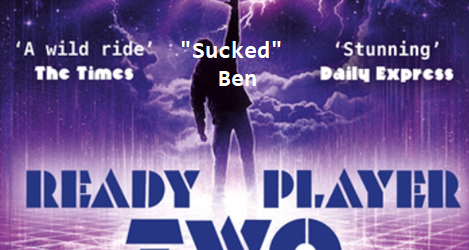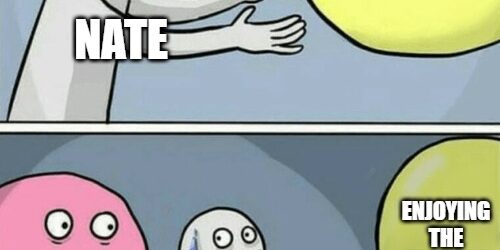Why So Hard on Lovecraft?

I’ve been a fan of the aesthetic of cosmic horror for much longer than I’ve been a fan of the work of H.P. Lovecraft. For the uninitiated, cosmic horror is a subgenre of horror that deals primarily with existential themes. It typically features alien beings whose intellect and powers are so far beyond our own that we may barely even be capable of realizing they exist. Direct exposure to these beings is usually a mind-shattering experience. H.P. Lovecraft was a pioneer of the cosmic horror genre and his “Cthulhu Mythos” has become something of a spiritual canon for the genre.
This may not shock any of you to learn, but I was something of an emo teenager. I loved Hot Topic, Anime, Alternative Music, and of course, nihilistic edgy horror. I was familiar with the Cthulhu mythos long before I ever turned a single page of Lovecraft’s work. Cthulhu’s appearance is described very vividly, especially by Lovecraft’s standards, and so his image made its way into a lot of popular media. In the early 2000’s Cthulhu, to me, was a fairly harmless symbol of rebellion and dissatisfaction. Embracing Cthulhu as a symbol of your angst was akin to embracing the inherent chaos of the universe.
Hardcore fans of the Lovecraftian mythos sometimes engage in a bit of the pageantry that the folks over at The Satanic Temple have perfected. Lovecraft fans don’t believe in a real Yog’Sothoth anymore than Satanic Temple members believe in a real Satan, but they adopt the symbols and aesthetic of ancient evil as a way of expressing themselves. Like with Satanic imagery, Lovecraftian imagery can be transgressive to the mainstream. This makes it inherently appealing to anyone who feels like an outsider. If you’re cast out into the darkness, then you might as well make friends with it.
As you might expect, there is a community of fans for whom Lovecraft’s work resonates very deeply. It’s been my experience that in some Lovecraft fan communities there is a tendency to take criticisms of Lovecraft personally. There is a vocal part of the fanbase that attempts to downplay the severity of Lovecraft’s bigotry, and the impact that said bigotry had on his work. Lovecraft apologists exist on a spectrum from those with plausible academic arguments to those who are just flat out incorrect in their assessment of Lovecraft’s opinions. There are legitimate arguments to be made that Lovecraft’s opinions on matters of race did not play as large of a role in his life as some critics would like to believe. I want to be very clear on one point, though. Even if it is true that racist politics and beliefs were not among Lovecraft’s principle interests, it does not mean that he was not a racist. It also does not mean that his views on race did not influence his work. They absolutely did.
The reason I want to be absolutely clear on this point is because nearly every time I have become involved in a public discussion of Lovecraft’s work it is inevitable that someone will claim that Lovecraft wasn’t that racist. A recent claim I have seen with increasing frequency is that Lovecraft was a racist earlier in his life, but that was largely due to his family’s influence, and that once he got out into the world he changed his beliefs. I’d like to show you a few examples of the sort of posts I see from a certain subset of the fandom.

This isn’t technically inaccurate, but it grossly misrepresents the facts. Reading this tweet you may think that Lovecraft realized that he had been wrong about the prejudices instilled in him by his family. That would be incorrect. Lovecraft was never what you would call “not a racist.” He eventually softened his belief in hardwired genetic differences between races regarding aptitude and temperament. Which was progress, but he still used racial slurs in his letters until the year he died. Charitably, we can probably assume that he never made it as far as embracing the idea of equality and integration for African Americans.

Here we have the argument that a lot of people were racist back then and that it is unfair to expect Lovecraft to have been enlightened on matters of race. Again, this is not inaccurate, but it is only half of the truth. Many of Lovecraft’s stories contain explicitly racist themes. We said it on the podcast but it merits saying one more time. It is not a matter of setting aside the man and consuming his art. The art itself is racist. If you are going to consume it, I don’t think it’s unreasonable for you to be aware of that, and to think about it.

My counter-arguments to the notion that Lovecraft’s racism was a minor problem have already been made in excruciating detail on the podcast, so I won’t go into them any farther here. The real reason that I’m writing this blog post is because of the feedback I got from some friends and family who were reading Lovecraft for the first time. They were surprised that I spent so much time on the racism problem in our Deep in the Crease and Shadow Over Innsmouth episodes. It wasn’t that they didn’t notice it. They had noticed it. They figured that Lovecraft was a racist, and they ignored those parts and moved on. For them, Lovecraft was just another horror writer. He had some weird ideas, but they weren’t super fans and they didn’t really care about him or his opinions. They simply judged the stories on their merits and moved on with their lives.
It was then that I realized that so much of what I was saying was a counter-argument to a group of people that most of the world doesn’t even know exists. I may have become too wrapped up in the Lovecraft fandom bubble. As I was preparing my Lovecraft scripts I feel like I forgot that Words About Books is a book discovery mechanism for many of our listeners. I went to great lengths to call out Lovecraft’s flaws because a failure to acknowledge them is a pet peeve I have within the Lovecraft fandom. In retrospect, I worry that I may have spent too much airtime on the criticism and not enough time establishing why it mattered.
I wish I had spent more of our runtime establishing why cosmic horror is such a powerful genre. I wish I had said more about how Lovecraft pioneered that genre. Please don’t misunderstand me, I am not back pedaling on anything I’ve said about his racism or his flaws. I just wish I’d done more to make the point that it is because Lovecraft is so influential and so important to so many impressionable young people that we need to talk about the problems that are baked into his writing.
H.P. Lovecraft feared the unknown. He feared the near-infinite depths of space and time. He feared strange people who had strange customs. He may even have feared his own curiosity that he could never quite extinguish.
We live on a placid island of ignorance in the midst of black seas of infinity, and it was not meant that we should voyage far.
-H.P. Lovecraft
There is a constant struggle in H.P. Lovecraft’s stories between ignorance and exploration, and if I may speculate a bit, this struggle probably existed within H.P. Lovecraft’s own heart as well. On the surface, Lovecraft and all of cosmic horror asserts that humanity is better off never venturing very far from our placid island of ignorance, but if we really believed that then we wouldn’t be reading H.P. Lovecraft. If the dreaded Necronomicon were to be discovered one day in a dusty New England attic there isn’t a single one of us who wouldn’t read it.
The impression I’ve always gotten from my readings of Lovecraft and from Lovecraft’s life story is that of a man who desperately wants to explore, but can’t quite overcome his fear. In his darker moments, he tells himself it’s better this way. There’s no treasure in that cave he fears to enter, only monsters. Every now and then though, he just can’t help himself. He gets married on a whim to an exotic and outgoing woman. These moments of manic impulse don’t last, unfortunately, and sooner or later the anxiety and fear come creeping back in. Lovecraft’s protagonists can’t help but explore, and they’re almost always punished for doing so. It’s hard for me not to see Lovecraft in his protagonists.
I stress Lovecraft’s flaws because I know a little something about anxiety and fear of the unknown. It is fine to read cosmic horror to better acclimatize yourself to the fear of the unknown, but you should never give into fear of the unknown. For Lovecraft, I think his bigotry stemmed largely from a fear of the unknown. His stories constantly cast foreigners as occultists with strange, foreign beliefs that ultimately sought to undermine the stability of the Anglo-Saxon majority. While Lovecraft likely did not believe in the supernatural, he did likely believe that foreigners had strange beliefs that would ultimately harm his superior culture. If Lovecraft had valued discovery and understanding more than he feared the unknown, he may have learned that his assumptions were very far off base.
I don’t worry so much for adults with fully formed world views and philosophies coming to Lovecraft for the first time. They will likely understand the complexities and flaws of the human being behind the stories. They will assign proper weight and importance to the wide variety of ideas he brings to the table. For younger readers who may be more easily influenced, I do think it’s important that we point out in no uncertain terms that wholly and unconditionally embracing Lovecraft’s work may not be consistent with our morals. I enjoy Lovecraft, but my affection for him is very much conditional. It is because the allure of cosmic horror is so strong that I feel compelled to be vocally critical of its more pernicious aspects.
Anyway here’s some Lovecraft themed J-pop






I appreciate the “deep in the crease“ podcast episode. I am neither a fan nor a critic of Lovecraft since this is the first time I’ve read his work. I did find myself reading and thinking that his stories reminded me of other horror stories I had either read or seen, which tells me that his ideas have been taken and used by other writers and TV shows. There is no question that he had fantastic ideas for sure. I just think he had trouble developing ideas but I also think he was lazy about finishing a complete story and therefore had disjointed parts to his stories and some unremarkable conclusions. It seems to me that he felt he should have been a wealthy aristocrat according to his so called breeding and I think the fact that he wasn’t made him feel insecure and inferior and I think putting others down with the racist aspects of his writing perhaps was how he dealt with his own insecurities and anxieties. I do believe he had creativity and had he gotten some therapy he could have realized a great deal of success in his lifetime.